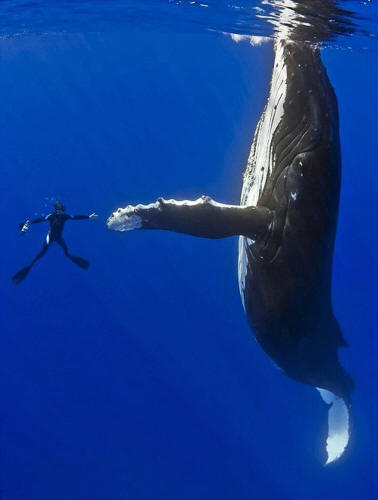|
|
|
What is consciousness anyway? Should it make us more compassionate than we are?
News that the universe we live in may actually be just a simulation "Star Trek" Holodeck style brings into question, well, pretty much everything. It's certainly an argument for agnosticism. But it's also fodder for discussing our behavior, and specifically, how we define compassion.
And whether or not it even matters.
The New York Times reports that in one possibility, we live in a computer simulation that's based on the laws of mathematics,
If it sounds like all the talk about circular time that's in HBO's "True Detective," that's kind of the point.
Statistically speaking, of course. And what is the real world, anyway?
So,
That brings up the pretty big question about consciousness and compassion.
And whether or not we have any obligations to "it" as it's expressed through all life - and those seemingly inanimate things - here on earth. Because if consciousness is in essence, being manufactured from another point in time, it doesn't just impact humans. It's affecting everything on earth right now.
One of the Buddhist Four Noble Truths states that all life is suffering.
That would seem to be the case regardless of whether or not we're "real." Regardless of where we originate from or where we go. To live is to suffer. And that's cause for compassion.
Christof Koch writes about this, specifically panpsychism, in the article "Is Consciousness Universal?" in Scientific American:
But for most humans on earth, the animal kingdom is still seen as something at our disposal.
We view consciousness from seated atop an illusory pyramid, when it appears it's more likely that we're actually just a blip along a straight line of (infinite) options. We have dominion, presently, because we're the bully in the ecological schoolyard who thinks lunch money gives us eternal power.
Of course, making the case for unilateral compassion is daunting if reality isn't what we think it is. If we live only because a mathematical digitized equation says we do, keeping giant whales in captivity or pigs in cramped cages for bacon doesn't really matter in the big picture.
Except that it does.
I defer to the film-making genius (seriously) of Seth Rogan and Evan Goldberg in "This is the End" - where making an ethical and compassionate choice instantly elevates you to the eternal party in the sky.
It's just that simple:
But what about lions and sharks and Nile crocodiles, you say. They must kill in violent manners to survive.
And what about defending ourselves, even against the ruthless attack of mosquitoes or wasps or fire ants? Certainly killing in the name of survival or self-defense appears to be justified. Even when it's to prevent a mosquito from biting you on your ass.
Still though, a,
We're becoming desensitized to nature, and therefore, behaving unnaturally. But isn't that natural, too?
In further explaining panpsychism, Koch writes that any system,
To say a rock doesn't feel isn't as factual as simply saying that we can't ever really know if that's the case because we're limited.
We're limited by our definitions of consciousness and our perception of reality. Because we can't know what it's like to be a rock. Really. The same can be said for the computer I type on. It's clearly smarter than I am in most every logical way and yet I deem it a tool, a prop that's unintelligent until I give it direction.
Where consciousness begins, so does the quest to understand where it comes from.
But there is one truth in all of these scenarios: that we are all part of something.
We're all experiencing some form of consensus reality, and compassion would seem to be the most vital tool in our survival.
We're humans who deeply understand the consequences of our actions.
We can choose not to acknowledge the deep suffering a cow or a chicken or a mink experiences for our benefit, but we know it's still happening. A true sign of consciousness is being aware of things we cannot or choose not to see directly at the present moment.
Where we are, or how we got here, don't matter in this equation - and it certainly doesn't matter to those creatures we choose to have (or not have) compassion for.
|


